冀教版英语九年级上册《Unit 3 Safety》单元知识点归纳
- 格式:doc
- 大小:45.00 KB
- 文档页数:13
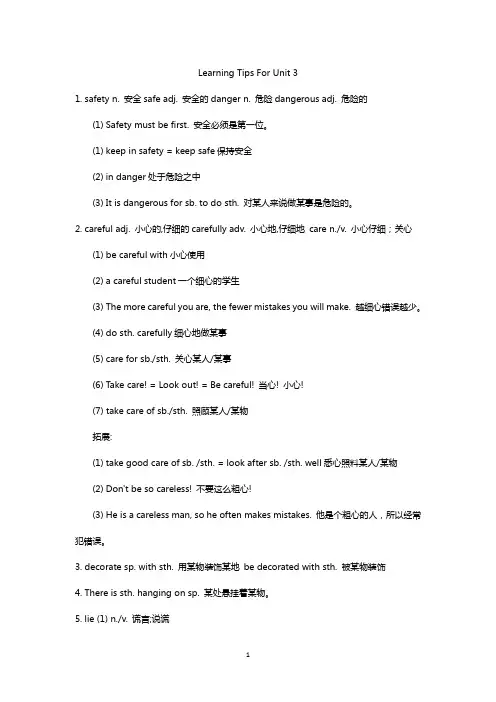
Learning Tips For Unit 31.safety n. 安全safe adj. 安全的danger n. 危险dangerous adj. 危险的(1)Safety must be first. 安全必须是第一位。
(1)keep in safety = keep safe保持安全(2)in danger处于危险之中(3)It is dangerous for sb. to do sth. 对某人来说做某事是危险的。
2.careful adj. 小心的,仔细的carefully adv. 小心地,仔细地care n./v. 小心仔细;关心(1)be careful with小心使用(2)a careful student一个细心的学生(3)The more careful you are, the fewer mistakes you will make. 越细心错误越少。
(4)do sth. carefully细心地做某事(5)care for sb./sth. 关心某人/某事(6)Take care! = Look out! = Be careful! 当心! 小心!(7) take care of sb./sth. 照顾某人/某物拓展:(1)take good care of sb. /sth. = look after sb. /sth. well悉心照料某人/某物(2)Don't be so careless! 不要这么粗心!(3)He is a careless man, so he often makes mistakes. 他是个粗心的人,所以经常犯错误。
3.decorate sp. with sth. 用某物装饰某地be decorated with sth. 被某物装饰4.There is sth. hanging on sp. 某处悬挂着某物。
5.lie (1) n./v. 谎言;说谎You are lying! = You are telling a lie. 你在撒谎!(2) v. 躺; 放置There is an English book lying on the ground. 地上有一本英语书。
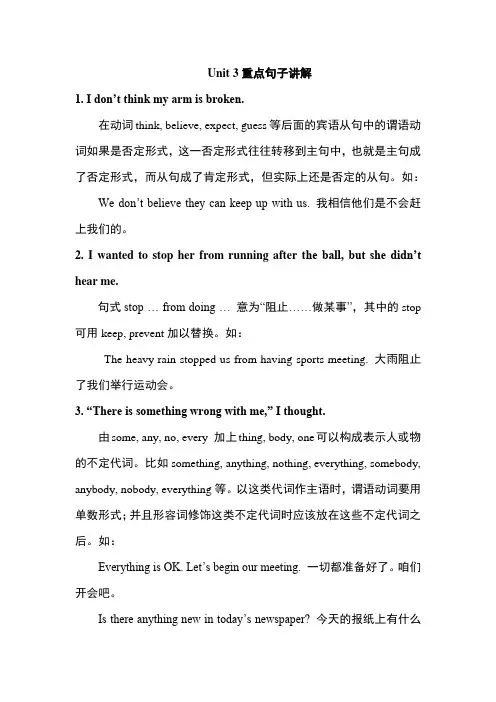
Unit 3重点句子讲解1. I don’t think my arm is broken.在动词think, believe, expect, guess等后面的宾语从句中的谓语动词如果是否定形式,这一否定形式往往转移到主句中,也就是主句成了否定形式,而从句成了肯定形式,但实际上还是否定的从句。
如:We don’t believe they can keep up with us. 我相信他们是不会赶上我们的。
2. I wanted to stop her from running after t he ball, but she didn’t hear me.句式stop … from doing … 意为“阻止……做某事”,其中的stop 可用keep, prevent加以替换。
如:The heavy rain stopped us from having sports meeting. 大雨阻止了我们举行运动会。
3. “There is something wrong with me,” I thought.由some, any, no, every 加上thing, body, one可以构成表示人或物的不定代词。
比如something, anything, nothing, everything, somebody, anybody, nobody, everything等。
以这类代词作主语时,谓语动词要用单数形式;并且形容词修饰这类不定代词时应该放在这些不定代词之后。
如:Everything is OK. Let’s begin our meeting. 一切都准备好了。
咱们开会吧。
Is there anything new in today’s newspaper? 今天的报纸上有什么新消息吗?4. It’s easy to slip and fall on a wet floor.不定式作主语时,往往用it作形式主语,而将不定式放在后面。
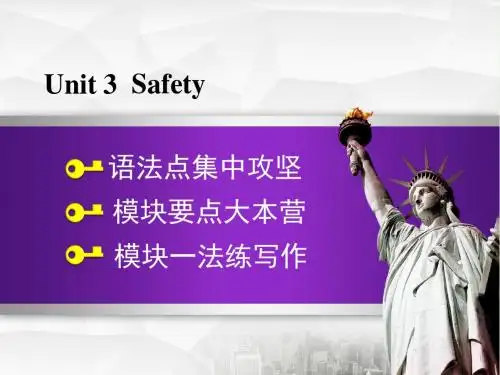
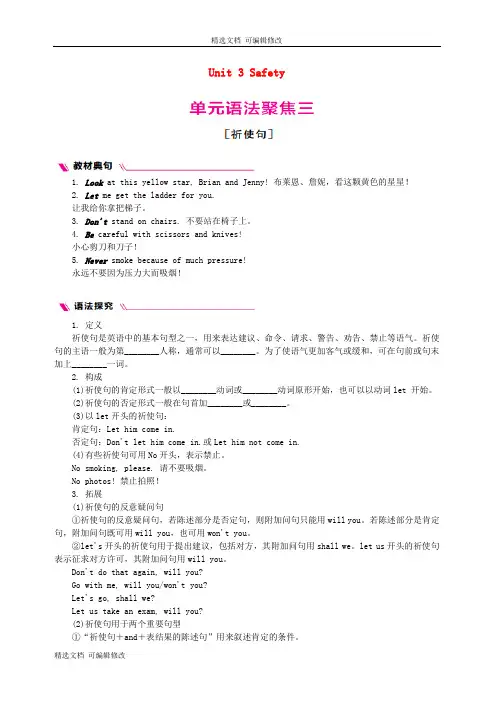
Unit 3 Safety1. Look at this yellow star, Brian and Jenny! 布莱恩、詹妮,看这颗黄色的星星!2. Let me get the ladder for you.让我给你拿把梯子。
3. Don't stand on chairs. 不要站在椅子上。
4. Be careful with scissors and knives!小心剪刀和刀子!5. Never smoke because of much pressure!永远不要因为压力大而吸烟!1. 定义祈使句是英语中的基本句型之一,用来表达建议、命令、请求、警告、劝告、禁止等语气。
祈使句的主语一般为第________人称,通常可以________。
为了使语气更加客气或缓和,可在句前或句末加上________一词。
2. 构成(1)祈使句的肯定形式一般以________动词或________动词原形开始,也可以以动词let 开始。
(2)祈使句的否定形式一般在句首加________或________。
(3)以let开头的祈使句:肯定句:Let him come in.否定句:Don't let him come in.或Let him not come in.(4)有些祈使句可用No开头,表示禁止。
No smoking, please. 请不要吸烟。
No photos! 禁止拍照!3. 拓展(1)祈使句的反意疑问句①祈使句的反意疑问句,若陈述部分是否定句,则附加问句只能用will you。
若陈述部分是肯定句,附加问句既可用will you,也可用won't you。
②let's开头的祈使句用于提出建议,包括对方,其附加问句用shall we。
let us开头的祈使句表示征求对方许可,其附加问句用will you。
Don't do that again, will you?Go with me, will you/won't you?Let's go, shall we?Let us take an exam, will you?(2)祈使句用于两个重要句型①“祈使句+and+表结果的陈述句”用来叙述肯定的条件。
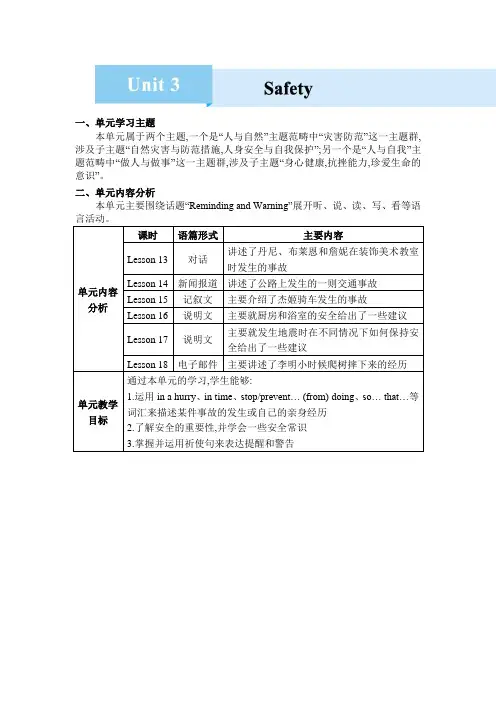
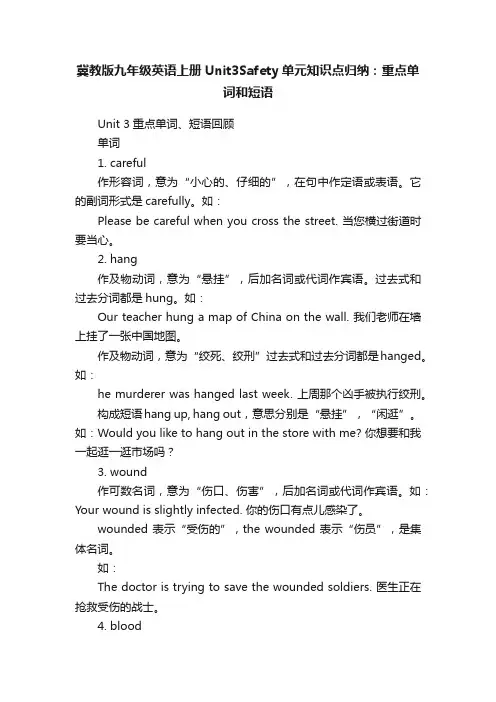
冀教版九年级英语上册Unit3Safety单元知识点归纳:重点单词和短语Unit 3重点单词、短语回顾单词1. careful作形容词,意为“小心的、仔细的”,在句中作定语或表语。
它的副词形式是carefully。
如:Please be careful when you cross the street. 当您横过街道时要当心。
2. hang作及物动词,意为“悬挂”,后加名词或代词作宾语。
过去式和过去分词都是hung。
如:Our teacher hung a map of China on the wall. 我们老师在墙上挂了一张中国地图。
作及物动词,意为“绞死、绞刑”过去式和过去分词都是hanged。
如:he murderer was hanged last week. 上周那个凶手被执行绞刑。
构成短语hang up, hang out,意思分别是“悬挂”,“闲逛”。
如:Would you like to hang out in the store with me? 你想要和我一起逛一逛市场吗?3. wound作可数名词,意为“伤口、伤害”,后加名词或代词作宾语。
如:Your wound is slightly infected. 你的伤口有点儿感染了。
wounded 表示“受伤的”,the wounded 表示“伤员”,是集体名词。
如:The doctor is trying to save the wounded soldiers. 医生正在抢救受伤的战士。
4. blood作不可数名词,意为“血、血液、血统”。
如:There is 83% of water in the blood. 血液中83%的成分是水。
5. stick作可数名词,意为“棍棒、枝条”。
如:You can tie the young tree to the stick. 你可以把小树绑在木棍上。
作及物动词,意为“粘贴、穿入、坚持”,后加名词、代词、不定式作宾语。
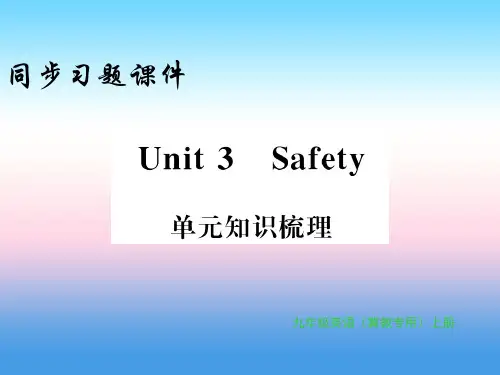
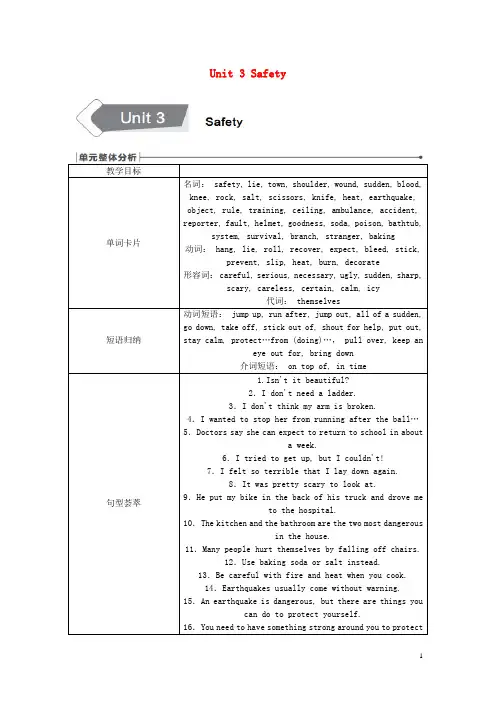
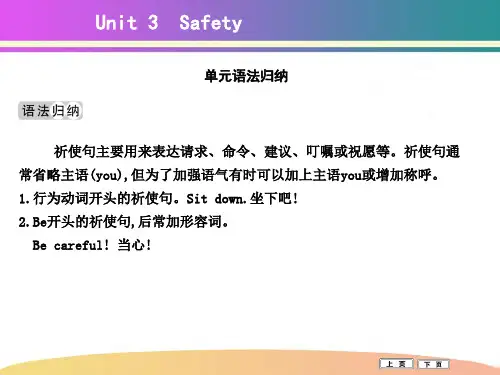
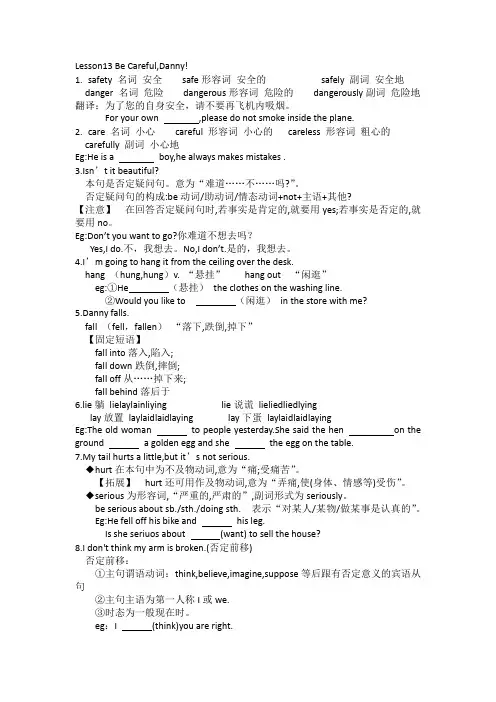
Lesson13 Be Careful,Danny!1.safety 名词安全safe形容词安全的safely 副词安全地danger 名词危险dangerous形容词危险的dangerously副词危险地翻译:为了您的自身安全,请不要再飞机内吸烟。
For your own ,please do not smoke inside the plane.2.care 名词小心careful 形容词小心的careless 形容词粗心的carefully 副词小心地Eg:He is a boy,he always makes mistakes .3.Isn’t it beautiful?本句是否定疑问句。
意为“难道……不……吗?”。
否定疑问句的构成:be动词/助动词/情态动词+not+主语+其他?【注意】在回答否定疑问句时,若事实是肯定的,就要用yes;若事实是否定的,就要用no。
Eg:Don’t you want to go?你难道不想去吗?Yes,I do.不,我想去。
No,I don’t.是的,我想去。
4.I’m going to hang it from the ceiling over the desk.hang (hung,hung)v. “悬挂”hang out “闲逛”eg:①He (悬挂)the clothes on the washing line.②Would you like to (闲逛)in the store with me?5.Danny falls.fall (fell,fallen)“落下,跌倒,掉下”【固定短语】fall into落入,陷入;fall down跌倒,摔倒;fall off从……掉下来;fall behind落后于6.lie躺lielaylainliying lie说谎lieliedliedlyinglay放置laylaidlaidlaying lay下蛋laylaidlaidlayingEg:The old woman to people yesterday.She said the hen on the ground a golden egg and she the egg on the table.7.My tail hurts a little,but it’s not serious.◆hurt在本句中为不及物动词,意为“痛;受痛苦”。
Unit 3重点单词、短语回顾单词1. careful作形容词,意为“小心的、仔细的”,在句中作定语或表语。
它的副词形式是carefully。
如:Please be careful when you cross the street. 当您横过街道时要当心。
2. hang作及物动词,意为“悬挂”,后加名词或代词作宾语。
过去式和过去分词都是hung。
如:Our teacher hung a map of China on the wall. 我们老师在墙上挂了一张中国地图。
作及物动词,意为“绞死、绞刑”过去式和过去分词都是hanged。
如:he murderer was hanged last week. 上周那个凶手被执行绞刑。
构成短语hang up, hang out,意思分别是“悬挂”,“闲逛”。
如:Would you like to hang out in the store with me? 你想要和我一起逛一逛市场吗?3. wound作可数名词,意为“伤口、伤害”,后加名词或代词作宾语。
如:Your wound is slightly infected. 你的伤口有点儿感染了。
wounded 表示“受伤的”,the wounded 表示“伤员”,是集体名词。
如:The doctor is trying to save the wounded soldiers. 医生正在抢救受伤的战士。
4. blood作不可数名词,意为“血、血液、血统”。
如:There is 83% of water in the blood. 血液中83%的成分是水。
5. stick作可数名词,意为“棍棒、枝条”。
如:You can tie the young tree to the stick. 你可以把小树绑在木棍上。
作及物动词,意为“粘贴、穿入、坚持”,后加名词、代词、不定式作宾语。
如:Mr. Zhang stuck a map on the wall. 张先生在墙上粘了一张地图。
6. heat作不可数名词,意为“热、热度”。
如:The sun gives us light and heat. 太阳给了我们光和热。
作及物动词,意为“使……温暖、加热”。
如:Danny heated the water just now and it is hot now. 丹尼刚才把水加热了,现在水热了。
7. rule作可数名词,意为“规则、原则、规定”,复数形式是rules。
如:At school we should obey the rules. 在学校我们应该遵守规则。
作及物动词,意为“管理、管辖”,后加名词或代词作宾语。
如:A young manager rules this company. 一位年轻的经理管理着这家公司。
8. training作可数名词,意为“培养、训练”,train作动词用,意为“训练”,这里的training 是它的动名词形式起名词作用。
如:You can use this machine after training. 经过训练你就会使用这台机器了。
短语1. try to do短语try to do something 意为“尽力做某事”;类似短语try doing something 则表示“尝试做某事”。
I’ll try to do everything well. 我将尽力做好每件事情。
Li Ming is trying to skate on the real ice. 李明正在尝试着在真正的冰上滑冰呢。
2. in a hurry短语in a hurry意为“匆忙、着急”,可用在系词后作表语,也可用在动词后作状语。
Why are you in a hurry, Li Ming? 你为什么这么着急,李明?Danny went to school in a hurry just now. 刚才丹尼匆匆忙忙地上学去了。
3. by doing…短语by doing…意为“通过……、由于……”,在句中作状语,表示原因或方式。
Lisa learns English by listening and speaking. 丽萨通过听和说学英语。
4. happen to短语happen to somebody (something) 表示“某人(物)出……事或发生情况。
Many things have happened to us these years. 这些年我们这里发生了很多事情。
祈使句的用法(上)祈使句是表示请求、命令、要求或建议的句子,其中的谓语动词一律用原形,句中不用主语,句尾用句号或感叹号。
含有第二人称主语的祈使句1.肯定形式的祈使句一般形式:动词原形+ 其他客套形式:动词原形+ 其他+ please 或Please +动词原形+ 其他如:Come to school on time. 要按时到校。
Come this way, please. = Please come this way. 请这边来。
Put your things here, please. = Please put your things here. 请把东西放在这里。
注意:如果祈使句中有称呼语,一定要用逗号将称呼语和祈使句隔开,称呼语可以用在句首,也可以用在句尾。
如:Li Ping, please leave here with us. = Please leave here with us, Li Ping. 李萍,请和我们一起离开这里。
2.否定形式的祈使句一般形式:Don’t + 动词原形+ 其他客套形式:Don’t + 动词原形+ 其他+ please 或Please + don’t + 动词原形+ 其他如:Don’t swim in this river. 不要在这条河里游泳。
Please don’t make any noise. = Don’t make any noise, please.请不要出声。
含有第一、第三人称主语的祈使句1.肯定形式的祈使句Let + 第一、第三人称的宾格代词或名词+ 动词原形如:Let us go at once. 让我们马上走吧。
Let her stay with you. 让她和你们一起留下来。
Let the girls go in first.让女孩先进去。
Let them do it by themselves. 让他们自己做吧。
注意:let’s 包括听话人,而let us不包括听话人。
这在反意疑问句中有明显的体现。
如:Let’s go fishing, shall we? 咱们去钓鱼吧,好吗?Let us go fishing, will you? 让我们去钓鱼,可以吗?2.否定形式的祈使句Let + 第一、第三人称的宾格代词或名词+ not + 动词原形或:Don’t let +第一、第三人称的宾格代词或名词+ 动词原形如:Let’s not say anything about it. 对这件事,咱们什么也不要说了。
Don’t let them play with fire.不要让他们玩火。
祈使句的用法(下)祈使句的特殊形式祈使句除了上述这两种形式之外,还有一些特殊形式,常用的有以下几种形式:1.副词+ 介词with短语,如:Away with them. 把他们带走。
Off with your hat. 摘下你的帽子。
Out with it. 把它拿出去。
On with your coat. 穿上你的外衣。
Up with your bag. 把你的包放在上面。
2.None + 介词of短语,如:None of that! 不要那样!None of your nonsense!不要胡说八道。
None of your little games. 不要耍你那套把戏了。
3.名词或代词+ 副词,如:Full speed ahead! 全速前进!Eyes left (right)! 向左(右)看齐!Hands up! 举起手来!This side up! 这边向上!Guns down! 把枪放下!Caps off! 摘下帽子!4.No + 名词、代词或动名词,如:No litter! 不准乱仍果皮纸屑。
No entry! 不准入内!No smoking! 禁止吸烟!No spitting! 不准随地吐痰!No parking! 禁止停车!5.有时为了起强调作用,you 可以出现在祈使句中。
,如:You keep quiet! 你要保持安静!Don’t you worry! 你不要担心!Unit 3易混淆词语辨析1. happen, take place, break out(1) happen作动词,意为“发生,碰巧”,指一切客观事物或情况的偶然或未能预见的发生。
常与to连用, happen to sb. 表示某人发生了某事;happen to do sth. 表示碰巧作某事。
如:The accident happened yesterday. 事故发生在昨天。
Did you hear what happened to David last night? 你听说大卫昨天晚上发生什么事了吗?(2) take place为固定词组,意为“发生,举行”,多指举行活动,指发生事先计划或预想到的事情。
happen以及词组take place 等只能用作不及物动词,不能用被动语态形式。
如:The meeting took place at 8:00 as planned. 按计划会议在8点举行了。
(3) break out意思为“发生、爆发”,常指战争、灾难、疾病或者争吵等事件的发生,也可以表示突然大声叫喊等。
如:Two world wars broke out last century. 上个世纪两次世界大战爆发了。
2. put out, put up, put off, put away(1) put out 意为“扑灭,熄灭”,还可以表示“生产,出版”。
如:The soldiers and others managed to put out the fire.士兵和周围的人一同把火扑灭了。
This magazine is put out every Friday. 这份杂志每星期五出版。
(2) put up 意为“升起;举起”;还可以表示“建造;搭起”。
如:If you have some questions, please put up your hands up. 如果你有问题,请举起手。
They put up a new house here. 他们在这里盖了一栋新房子。